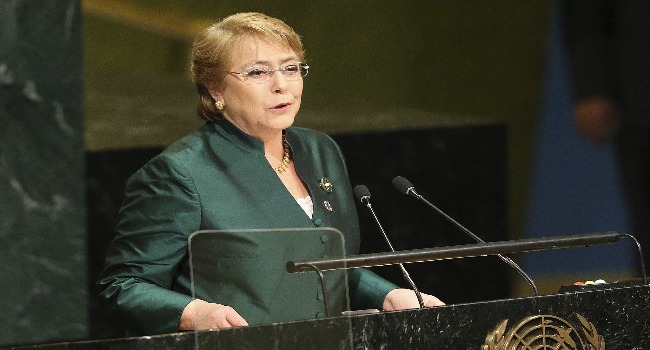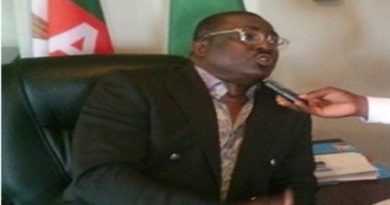UN marks #EndSARS anniversary, urges Nigeria to address police brutality as protesters worry about police operations
Michelle Bachelet, the United Nations High Commissioner for Human Rights joined other human rights organisation to mark the second anniversary of the #EndSARS protests.
In 2020, Nigeria witnessed a powerful uprising as thousands took to the streets under the #EndSARS banner, demanding an end to police brutality and justice for victims.
Bachelet called on the Nigerian authorities to address the root causes of the protests and ensure accountability for human rights violations, according to a statement.
“In the #EndSARS protests, the Nigerian people demanded an end to police brutality and extrajudicial killings,” Bachelet said. “The protests faced a harsh crackdown, leading to the deaths of at least 56 people, including 12 at the Lekki Toll Gate in Lagos on 20 October 2020.”
While the Special Anti-Robbery Squad (SARS) was disbanded following the protests, there have been few concrete reforms to address the ongoing issues of police brutality and impunity in Nigeria.
Furthermore, Bachelet urged the Nigerian authorities to implement the recommendations of the Lagos State Judicial Panel of Inquiry into the Lekki Toll Gate incident and establish an independent police oversight mechanism to investigate and prosecute allegations of police misconduct.
“The #EndSARS protests were a reminder that the Nigerian people have the right to demand accountability from their government,” Bachelet stated. “I urge the authorities to listen to the voices of the people and take necessary steps to ensure that all Nigerians can live free from fear of police brutality.”
Similarly, Amnesty International marked the second anniversary of the #EndSARS protests by highlighting the ongoing lack of justice for victims of police brutality and extrajudicial killings in Nigeria.
The protests called for the disbandment of the Special Anti-Robbery Squad (SARS), a notorious police unit responsible for widespread human rights abuses. Despite the disbandment of SARS in October 2020, the underlying problems of police brutality and impunity persist.
“The Nigerian authorities have not held police officers accountable for these abuses, and some have been promoted or redeployed to other units,” according to Amnesty International. “This lack of accountability has created a climate of impunity, allowing police officers to continue committing human rights abuses.”
Human Rights Watch also voiced concerns regarding the lack of accountability for human rights abuses. The organization called on the Nigerian authorities to conduct prompt, impartial, and effective investigations into all allegations of police brutality and extrajudicial killings, prosecute those responsible for human rights abuses in fair trials, provide reparations to the victims of police brutality and extrajudicial killings, and implement comprehensive reforms to address the underlying problems of police brutality and impunity in Nigeria.
“Two years after the #EndSARS protests erupted across Nigeria, the government has failed to deliver justice to victims of police brutality and extrajudicial killings,” Human Rights Watch noted. “We call on the Nigerian authorities to take action on multiple fronts to address these critical issues.”
Nigerians living in South Africa protest in solidarity with youths back home protesting misgovernance and police brutality on Wednesday, Oct. 21, 2020 in Praetoria.
Meanwhile, stakeholders in the #EndSARS protest have expressed their positions about the struggle.
Ikponmosa, a fervent on ground #EndSARS protester, expressed her concerns, “The fight was never just about ending SARS, but also about ensuring accountability and justice prevail in the police force. While there have been fewer cases of brutality, the lack of transparent processes is disheartening. We need to see genuine efforts in police reform and a system that holds officers accountable for their actions.”
However, Chijioke, a young citizen who participated in Ikeja protests, remains hopeful, “Change takes time. We can’t expect a complete transformation overnight. I’ve noticed some improvements; there are officers engaging positively with the community. However, we must remain vigilant and continue pushing for systemic change.”
Fatima, who protested in Abuja, voiced her disappointment, “I feel betrayed. The government promised change, but it seems like they’ve swept the real issues under the rug. Incidents of brutality might be fewer, but the lack of justice for the ones that were grounded is glaring. I heard of compensations made to families but to the best of my memory they were too little.”
Ahmed, who observed the #EndSARS movement from the sidelines, shared a balanced view, “The reduction in reported cases of brutality is a positive sign, but it’s not enough. We need to see a complete overhaul of the police system, including better training and stricter accountability measures. While progress has been made, there’s still a long way to go.”
Zara, a victim of police brutality who found the strength to speak out, stated, “I had a horrific encounter with the police in 2018. While I appreciate the reduced brutality cases, I am haunted by the lack of justice. My story is just one of many. We demand transparency, an unbiased legal process, and reparations for the victims. Our fight continues until justice prevails.”
Basil Abia, a prominent voice in the #EndSARS movement in Abuja, emphasised the need for action. “Our fight to end police brutality and corruption in Nigeria continues. The current state of police operations in our country remains deeply troubling, with rampant corruption and a lack of accountability. The absence of body cameras to check extrajudicial killings and human rights violations by police officers is a severe concern. To honor the EndSARS memorial, we call for justice, transparency, and police reform.”



